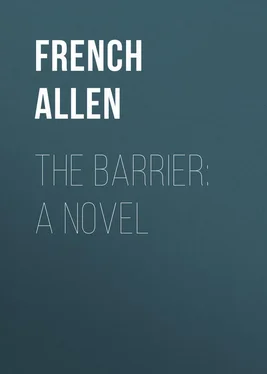Allen French - The Barrier - A Novel
Здесь есть возможность читать онлайн «Allen French - The Barrier - A Novel» — ознакомительный отрывок электронной книги совершенно бесплатно, а после прочтения отрывка купить полную версию. В некоторых случаях можно слушать аудио, скачать через торрент в формате fb2 и присутствует краткое содержание. Жанр: foreign_antique, foreign_prose, на английском языке. Описание произведения, (предисловие) а так же отзывы посетителей доступны на портале библиотеки ЛибКат.
- Название:The Barrier: A Novel
- Автор:
- Жанр:
- Год:неизвестен
- ISBN:нет данных
- Рейтинг книги:4 / 5. Голосов: 1
-
Избранное:Добавить в избранное
- Отзывы:
-
Ваша оценка:
- 80
- 1
- 2
- 3
- 4
- 5
The Barrier: A Novel: краткое содержание, описание и аннотация
Предлагаем к чтению аннотацию, описание, краткое содержание или предисловие (зависит от того, что написал сам автор книги «The Barrier: A Novel»). Если вы не нашли необходимую информацию о книге — напишите в комментариях, мы постараемся отыскать её.
The Barrier: A Novel — читать онлайн ознакомительный отрывок
Ниже представлен текст книги, разбитый по страницам. Система сохранения места последней прочитанной страницы, позволяет с удобством читать онлайн бесплатно книгу «The Barrier: A Novel», без необходимости каждый раз заново искать на чём Вы остановились. Поставьте закладку, и сможете в любой момент перейти на страницу, на которой закончили чтение.
Интервал:
Закладка:
"But I should know what he would think," persisted the young lady.
Miss Cynthia advanced to fury, scarcely repressed. "No, you wouldn't!" she denied emphatically. "I won't have you laugh at him."
"Why, you laugh at him yourself," said Beth. "You know you do."
"And if I do?" retorted Miss Pease. "Let me tell you he's the dearest, kindest man that ever – "
"Why, Miss Cynthia," cried the other, "don't I know?"
"Nobody knows," was the response.
Now all grades of opposition, from caustic irony to smothered denunciation, were habitual in Miss Pease's manner, but as she said "Nobody knows," lo! there were tears in her voice, if not in her eyes.
"Miss Cynthia!" cried Beth.
Miss Pease was gaunt and grewsome, so that her manner fitted her perfectly, but now as she sat winking her eyes and twisting her face she became pathetic. The girl rose quickly and came to her side.
"Have I hurt you?" she inquired anxiously.
"No, child, no," answered Miss Pease, recovering herself. "You didn't know what a sentimental old fool I am, did you? There, sit down again. You see," (she hesitated before committing herself further) "I was thinking, just before you came, of what Peveril has been to me. Your talk roused me again."
"He has done a great deal for you?" asked Beth with sympathy.
"Everything in the world!" answered Miss Cynthia warmly, not having resumed her manner. "Since our grandfather died Peveril has been my protector, though he is two years younger. You know we were very poor at first."
"Very poor?"
"We had nothing but debts," stated Miss Cynthia. "We lived in boarding-houses for seven years before Peveril could buy the homestead and get the strangers out of it. It was a proud day when he brought me here, and told me this was mine to live in until the end of my life. And yet for two years more I went daily to my work – I was in Benjamin's great dry-goods store, my dear – until when they asked me to be the head of the linen department Peveril said I should work no more, and insisted on my staying at home."
"I never heard of that," cried Beth. "That you were ever in Benjamin's!"
"And a very good saleswoman I was," said Miss Cynthia. "But after that the money began to come in to us, and Peveril sold the land where the Security Building now is. I have not done a piece of work since then, except for Peveril or for charity. I am a rich woman, my dear."
"But you do so much for charity!" exclaimed Beth with enthusiasm.
When it came to praise, Miss Pease became grim at once. "I've got to keep busy with something," she snapped.
"But tell me more," begged Beth.
"There is nothing more," declared Miss Cynthia. "And now I hear him coming, five minutes before the hour, just as he always does. Don't be afraid of him; he has the softest heart in the world, as you ought to discover, since you had the skill to find mine."
Beth had only the time to squeeze her friend's hand as the two stood up together. She had discovered Miss Pease's heart; it was an unconscious specialty of Beth's to find the weak points in the armour of forbidding persons, and she had on her list of friends more of the lonely and unknown than had many a worker in organised charity. She was, in fact, a worker in her own special field, the well-to-do, bringing them the sympathy and affection which they needed as much as do the poor. She had neither shrewdness nor experience; what she did was quite unconscious, but her value was unique. Mr. William Fenno, who had no love for his wife's pleasures and whose daughters took after their mother, loved to have the girl with him. Judge Harmon, not quite at home by his own gas-log, felt more comfortable if Beth were spending the evening with him – for she made no pretense of coming to see his wife. Quite unconsciously, a similar bond had been growing up between Beth and Miss Pease, and took open recognition on that day when Miss Cynthia, allowing her eyes to be pleased by the girl's freshness, blurted her feeling and said: "I like you. You are so unlike your sister."
But now Mr. Pease entered the room, and stood bowing while his cousin repeated the formula: "Peveril, here is Miss Elizabeth Blanchard. Beth, you remember my cousin, Mr. Peveril Pease?"
Beth thought he was "funny," meaning he was peculiar. He was short and rotund, he was immaculate and formal. His eyes met hers soberly, as if he had little of his cousin's wit, however much less savage. Talk opened with the golf club tea, and before the subject was exhausted he led the conversation dexterously to the weather. Dinner was announced while the beauty of the spring was yet under discussion, and at table, for a while, Beth was still repeating to herself that he was a "funny" little man.
Curiously, Pease was in an entirely new situation. Never had he been so placed that he must give an hour's undivided attention to a girl. He had never learned that girls have individuality; he avoided them as a rule, and at dinners there was always one at his left hand to relieve the other at his right, so that he never spoke to either of them long. Besides, not being regarded as a marrying man, Pease was invariably given the "sticks" to entertain. Girls had been to him, therefore, undeveloped creatures, displaying similar characteristics, being usually unacquainted with serious topics, and (quite as usually) devoid of personal attractions. Beth Blanchard, however, was something different. Without dwelling on her charms, it is enough to say that she was pretty; and without entering upon her mental acquirements, let us believe that she knew what was going on. She was quite used, moreover, to the society of older persons, and could meet Pease on many grounds, although it happened that the subject chosen was Europe.
"You have been there?" asked Pease quickly when Germany was mentioned.
"We spent some time there," Beth replied.
"Of course you have seen Weimar, then," Pease assumed. He happened to be right.
"Oh, yes," she answered, quite as if Weimar were still a focus of travel. "We spent a month there; mamma was quite ill. You know" – and here she addressed Miss Cynthia – "that she died over there, and then we came home."
Mr. Pease, in conjunction with his cousin, murmured his condolences, and Miss Blanchard, not to make the evening doleful, turned again to speak of Weimar.
"We lived quite near to Goethe's house," she said.
Then she beheld Mr. Pease glow with admiration. "You are very fortunate," he cried. "The inspiration must have been great."
"I am no writer, Mr. Pease," returned Beth.
"But," he explained, "it must have permanently bettered and improved you."
"Do you think I needed it?" she flashed.
Miss Cynthia, at her end of the table, was biting her lip. Pease, not perceiving that he was being rallied, fell to apologising. "Oh, no," he gasped. "I meant – "
She spared him. "I was not serious," she laughed. "You must pardon me." It was no new matter with her to relieve the embarrassed. Then she led him once more to the topic.
"You like Weimar, Mr. Pease?"
"Oh, I only like Goethe, you know, and Schiller. I've never been from America."
"And yet you read German?"
"Not very well. You see, I – "
And then he spoke of himself. Miss Cynthia sat amazed. Here was Peveril, who was always silent regarding his hobby, speaking from his heart. Beth coaxed a little; he hung back a bit, but he yielded. It was as if a miser were giving up his gold, yet the gold came. For all that she had invited Beth there, wishing to stir her cousin from his rut, Miss Cynthia presently became enraged. Peveril was telling more than he had ever told her. This chit of a girl, what charm had she?
But Pease himself, as he told the unaccustomed tale in halting sentences, felt comfort. It had been a long time repressed within him; he had seldom touched on it with Cynthia, and though he had not known it, the loneliness of it had been wearing on him all these years. It was sympathy that now brought it out, that quality in Beth which could pierce the armour of such a cynic as Miss Cynthia, or warm so cold a heart as William Fenno's. Pease yielded to it as frost to the sun. So he told of himself and his studies, and the impulse of all these years he confessed at the last.
Читать дальшеИнтервал:
Закладка:
Похожие книги на «The Barrier: A Novel»
Представляем Вашему вниманию похожие книги на «The Barrier: A Novel» списком для выбора. Мы отобрали схожую по названию и смыслу литературу в надежде предоставить читателям больше вариантов отыскать новые, интересные, ещё непрочитанные произведения.
Обсуждение, отзывы о книге «The Barrier: A Novel» и просто собственные мнения читателей. Оставьте ваши комментарии, напишите, что Вы думаете о произведении, его смысле или главных героях. Укажите что конкретно понравилось, а что нет, и почему Вы так считаете.












